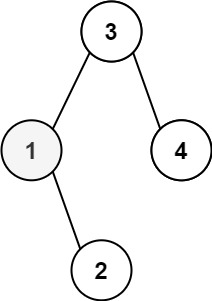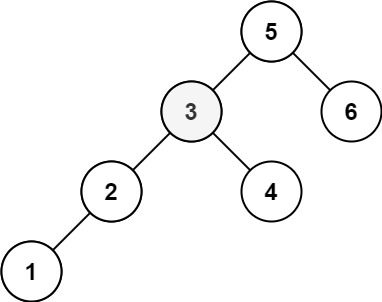LeetCode-in-All
230. Kth Smallest Element in a BST
Medium
Given the root of a binary search tree, and an integer k, return the kth smallest value (1-indexed) of all the values of the nodes in the tree.
Example 1:

Input: root = [3,1,4,null,2], k = 1
Output: 1
Example 2:

Input: root = [5,3,6,2,4,null,null,1], k = 3
Output: 3
Constraints:
- The number of nodes in the tree is
n. 1 <= k <= n <= 1040 <= Node.val <= 104
Follow up: If the BST is modified often (i.e., we can do insert and delete operations) and you need to find the kth smallest frequently, how would you optimize?
Solution
/**
* Definition for a binary tree node.
* struct TreeNode {
* int val;
* struct TreeNode *left;
* struct TreeNode *right;
* };
*/
#include <stdio.h>
#include <stdlib.h>
// Helper struct to hold state across recursive calls
struct Solution {
int k;
int count;
int val;
};
// Function to create a new tree node
struct TreeNode* createNode(int val) {
struct TreeNode* newNode = (struct TreeNode*)malloc(sizeof(struct TreeNode));
newNode->val = val;
newNode->left = NULL;
newNode->right = NULL;
return newNode;
}
// Helper function to perform in-order traversal and find the k-th smallest element
void calculate(struct Solution* sol, struct TreeNode* node) {
if (node == NULL || sol->count >= sol->k) {
return;
}
if (node->left != NULL) {
calculate(sol, node->left);
}
sol->count++;
if (sol->count == sol->k) {
sol->val = node->val;
return;
}
if (node->right != NULL) {
calculate(sol, node->right);
}
}
// Function to find the k-th smallest element in the BST
int kthSmallest(struct TreeNode* root, int k) {
struct Solution sol = {k, 0, 0};
calculate(&sol, root);
return sol.val;
}
// Helper function to free the tree memory
void freeTree(struct TreeNode* root) {
if (root == NULL) return;
freeTree(root->left);
freeTree(root->right);
free(root);
}

